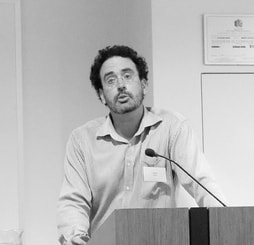|
By Becky Holland  How do you begin a poem? For me, a poem begins with an inspired, though fleeting, thought or impression that I realize I must write down promptly, or risk losing. I tend to begin poems outside, in contact with the earth—with a notebook, leaning against a tree or smelling a plant—but I usually finish poems indoors, in insulated comfort, and occasionally a long while after I initiated them. I’m fascinated by language, and particularly by archaic and scientific terminology, so poems can be prompted by odd words. On a much different note, a poem sometimes begins with a broiling sense of indignation that I feel I should set free. What poets do you continually go back to?
As I was born, raised, and educated in the United States, I continually go back to Emily Dickinson, Walt Whitman, William Carlos Williams, Robinson Jeffers, and Mary Oliver as well as Native American poets like Joy Harjo and Simon Ortiz. I enjoy the poetry of Judith Wright, Les Murray, and other Australians too. I’m intrigued by Murray’s book Translations from the Natural World in which he speaks from the perspectives of plants. At the moment, I’m reading British poet Elisabeth Bletsoe’s short work Pharmacopœia—talk about odd words and plants! Has your idea of what poetry is changed since you began writing poems? Definitely. My idea of what poetry is changed today—and will change again tomorrow, or tonight. In fact, it’s changing as I write this now. I used to go for Romantic rhyming poetry (as a teenager) and then I went free-form when I learnt that rhyming and Romanticism were apparently outdated (as a twenty-something). Now I’m back to rhyming. Who knows how long it will last. I try to experiment with unpredictable placements of rhymes or off-rhymes. I oscillate between poetry that tells a story—narrates events and describes actual objects—and poetry that tries to evoke an nondescript mood, essence, or memory. Poetry is a wonderfully diverse thing. Are you on Facebook or Twitter? Does that fit into your writing life, and if so, how? To be honest, I tried to integrate Facebook and Twitter gracefully into my writing life but failed or didn’t try hard enough. I find that, because I spend a lot of time writing (and on a computer writing), I am reluctant to spend more digital time maintaining a Facebook or Twitter profile. As someone who craves privacy in world increasingly without the luxury of anonymity, social media doesn’t entirely suit my disposition. Having said that, I think Facebook and Twitter can be very effective ways to publicize one’s writing and build contacts with other writers and with publishers. I’ve found that presses are more interested in authors with established social media followings and online platforms. That helps to ease their minds about marketing a book. Do you have a writing group or community of writers you share your work with? Who are they? When I lived in Perth between 2008 and 2015, I was quite active, as a poetry workshop facilitator and participant, in the three centres there (Peter Cowan Writers’ Centre, Katharine Susannah Prichard Writers' Centre, and the Fellowship of Australian Writers, WA). I edited a number of anthologies and journals promoting local writing. I believe that having a few trusted fellow writers with whom to share work is exceedingly valuable, but it’s not essential for everyone. Indeed, the craft of some shines with reclusion. It’s important to work out what will benefit one’s current and future writing the most. When I lived in northern Thailand in 2016, I had no access to a writing community because everyone around me spoke Thai. I had to become a reclusive scrivener then. What’s the best advice you ever had about how to be more creative? The best advice I’ve been given is to write regularly and everyday if possible. Write for 10 minutes at 6.30 am. Write for 6.5 hours at 10pm. Write when opportunities present themselves: weekends, retreats, workshops, on the bus, lying in bed, at the dreaded airport. Privilege writing as a practice, habit, requirement, compulsion, priority, orientation, way of making sense of the world. Creativity comes with some form of continuity or, even, discipline. I learnt a lot from a well-regarded poet (now over 80 years old) who scribbled poems on the back of handouts or napkins while attending lectures. Another poet (also well-known, and also almost 80) taught me much when he said he chose poetry, as a young man, when he realized he didn’t have the sustained concentration necessary to write a novel! Comments are closed.
|
AuthorThe NEWC Board Archives
June 2024
Categories
All
|